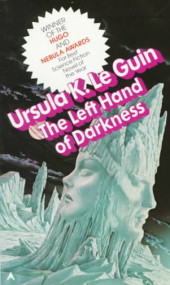If it can be said that fantasy is defined by containing some element of the fantastic or magic then science fiction is all about the technology. Just like fantasy, though, sci-fi is a lot more than its base elements. There are many different kinds of science fiction that is written for many purposes.
The first flavor of sci-fi is space operas. Space operas are the space adventures like Star Wars or others stories were the hero goes jetting about the universe saving the world. Now just because it is a space opera does not mean that it lacks any substance. In many ways, I think Star Trek (yes, I know it is a show not a book, cut me some slack) falls in the category of a space opera since all but one of the series are about people on space ships zooming around the universe interacting with alien races but it is not all fluff. I have heard some very intelligent people argue the social implications of Star Trek. (This goes into a sci-fi rant I have later. I might even get to it today.)
One of my favorite flavors of science fiction is called cyberpunk. Worlds in cyberpunk tend to be grittier and filled with a blurring of the lines between humans and machines. Elements like cybernetic implants and highly advanced artificial intelligence are very prevalent in cyberpunk. William Gibson’s books and short stories also embody another popular element in cyber punk with the highly urban settings and encompassing urban sprawl. His books and Philip K Dick’s books (more specifically Do Androids Dream of Electric Sheep) also epitomize another big element of cyberpunk, the blurring of the lines of what makes us human.
I am absolutely positive there is a term for the rest of science fiction about technologically advanced societies. I just don’t know it and I am not in the mood to go searching for it. But, there is another more popular area of science fiction about futuristic societies doing futuristic things. Some of these are highly technical and intricate. I guess these would be considered along the line of “hard” science fiction. Issac Asimov is one big example of this. I haven’t been a big fan of this kind of sci-fi since they seem somehow cold to me. They are more interested in the technology than the people. I am probably absolutely wrong here though and I need to go back and reread stories.
It is now time for my big science fiction rant.
 Science fiction catches a lot of crap. People look at it as a bunch of nerds thinking about aliens and gizmos. This is true in some cases. I think, though, science fiction always the author to make observations about society in an effective way. Think of it this way; science fiction allows a certain distance from the problems that the author is commenting on. It is much more comfortable to discuss prejudice when it is about aliens and not making automatically triggering our social sensitivities. It is much easier to discuss racism when the colors involved are blue and green and not black and white. Gender roles are much easier to examine when it takes place on some ungodly frozen planet with aliens with changeable gender rather than men and women in a modern setting. This is the purpose for science fiction, to allow us to examine ourselves from a safe distance so we can understand not only our prejudices and roles in lives but also what makes us human. (Go read some Le Guin and William Gibson, you will be a better person for it!)
Science fiction catches a lot of crap. People look at it as a bunch of nerds thinking about aliens and gizmos. This is true in some cases. I think, though, science fiction always the author to make observations about society in an effective way. Think of it this way; science fiction allows a certain distance from the problems that the author is commenting on. It is much more comfortable to discuss prejudice when it is about aliens and not making automatically triggering our social sensitivities. It is much easier to discuss racism when the colors involved are blue and green and not black and white. Gender roles are much easier to examine when it takes place on some ungodly frozen planet with aliens with changeable gender rather than men and women in a modern setting. This is the purpose for science fiction, to allow us to examine ourselves from a safe distance so we can understand not only our prejudices and roles in lives but also what makes us human. (Go read some Le Guin and William Gibson, you will be a better person for it!)



Geeks a Geeking